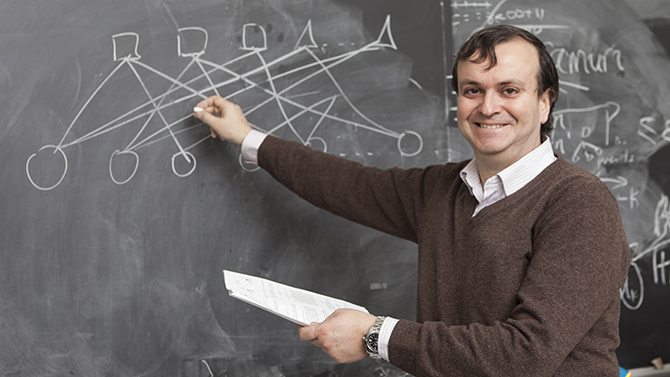


High-throughput communications
Photo by Ambre Alexander Payne June 30, 2016
NSF grant supports work on novel systems for high-throughput transmission of digital information
Javier Garcia-Frias, professor in the Department of Electrical and Computer Engineering at the University of Delaware, has been awarded a grant from the National Science Foundation to develop novel hybrid analog-digital systems for high-throughput transmission of digital information.
The development of these systems is of interest in applications such as image and video coding, sensor networks and medicine.
The three-year $403,000 award will support the development of systems aimed at overcoming the challenge of variations in channel quality and exploiting temporal and spatial correlations in source information.
First, a digital-to-analog encoder will produce analog outputs from input binary digits, known as bits, and, second, a digital encoder will produce coded bits.
“The key idea is to take advantage of the analog component to achieve high-throughput communications and robustness against changes in the channel conditions, something that is challenging with standard digital systems,” Garcia-Frias says.
“On the other hand, the use of pure digital-to-analog encoders would lead to significant error floors, with consequent performance degradation, but, thanks to the use of the digital encoder sub-block, these error floors can be substantially reduced to achieve excellent performance.”
Garcia-Frias says that to the best of his knowledge, hybrid analog-digital coding systems have not been applied for the encoding of digital sources. This is relevant because the decoding procedures for digital sources are very different from those applied to analog sources. However, it is possible to develop simplified decoding techniques by approximating the digital source as an analog one.
“With this approach,” he says, “we can take advantage of the fact that, by choosing the appropriate algorithms, the decoding complexity of analog sources can be much less than that of traditional techniques for digital sources.”
Research on this topic is in its infancy, so this work has the potential to fill a major gap in the field of communications while also educating students in this area.
The project, “Hybrid Analog-Digital Schemes for Joint Source-Channel Coding of Digital Sources” (CCF-1618653), is supported by the National Science Foundation’s Division of Computing and Communication Foundations.
Contact Us
Have a UDaily story idea?
Contact us at ocm@udel.edu
Members of the press
Contact us at 302-831-NEWS or visit the Media Relations website

